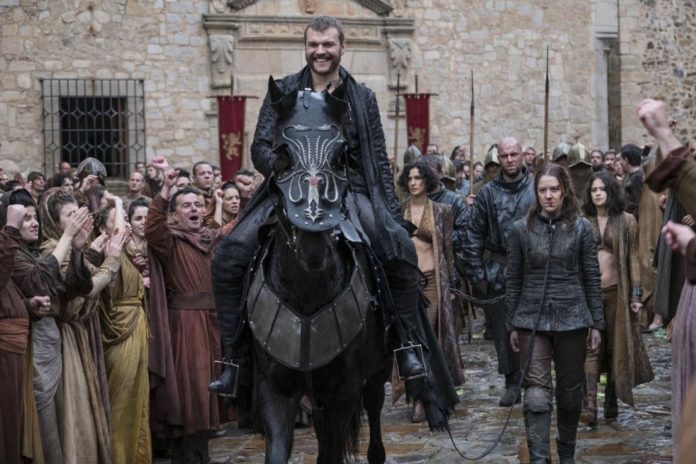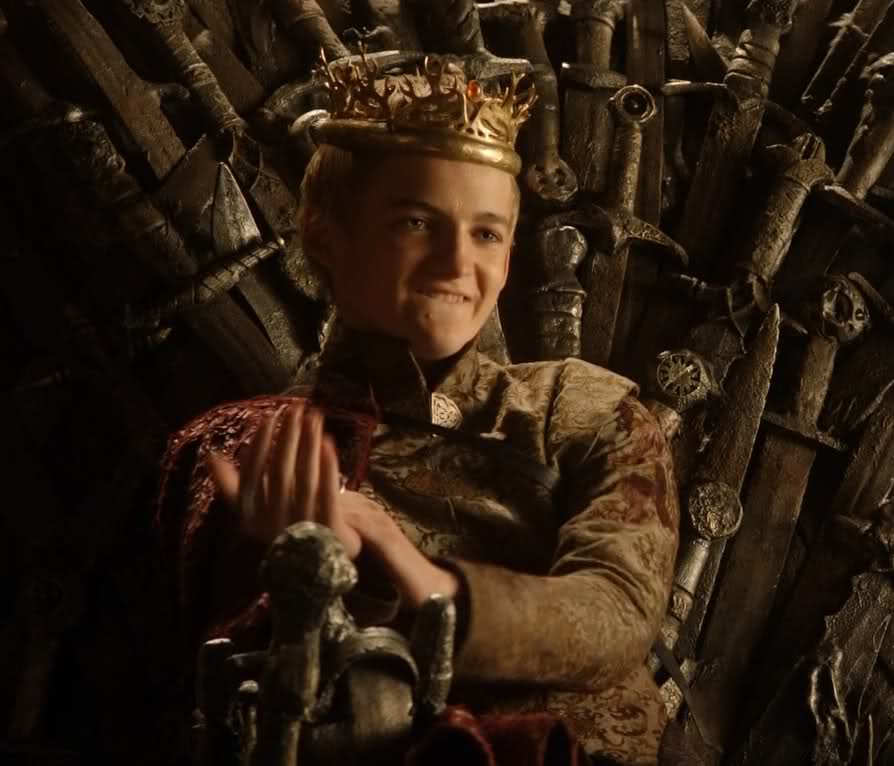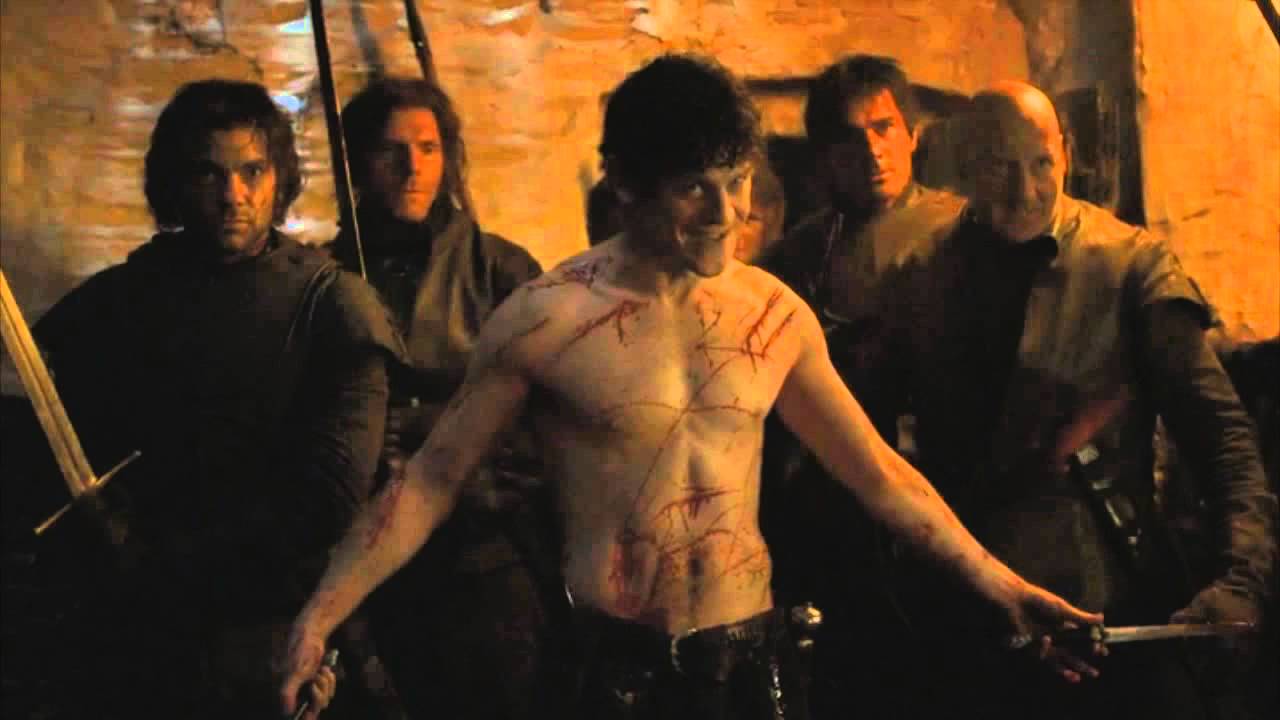For a show that revels in moral complexity, Game of Thrones’ villains are beginning to feel as if they are cut from the same cloth. Before the release of the latest season of HBO’s hit series, Pilou Asbæk, who plays the bombastic, belligerent Euron Greyjoy, announced to the media that his piratical character was going to make the recently deceased Ramsay Bolton “look like a little kid.” At the time, I couldn’t help but sigh. I was burnt out on Ramsay’s relentless brand of snarky, supervillain shenanigans (he lost me somewhere between his shirtless stand against Yara and his handy use of twenty good men to bring down Stannis’ army) and I had been hoping that his successor would shake things up a little bit. Then I questioned why I knew he was going to have a successor. Couldn’t Westeros survive a few weeks without a reliably wretched psychopath to shake things up?
When Season Seven finally aired, Euron didn’t necessarily make Ramsay look like a little kid—he seemed more like a little kid who was exaggeratedly emulating Ramsay’s most extravagant qualities. At some point, the fact that Ramsay’s flamboyant histrionics and constant desire for drama were juvenile expressions of insecurity and instability got lost in translation, and foisting these wild displays of over-emphasized villainy onto a middle-aged, well traveled pirate (and perhaps aspiring rock star, given his make-over this season) felt awkward and most of all, redundant.
Over the years, I have found myself repeatedly asking, just how many psychopaths live in Westeros—all at one period of time? Is there something in the water?* As Thrones winds up, I can’t help but wish there had been a more nuanced approach to the show’s most prominent villains. Of course, this is Game of Thrones, one might argue—isn’t almost everyone besides the demure Daenerys, and the near-sanctimonious Jon Snow a bit villainous? You would think that, given that we approach Thrones with an expectation of blurred lines when it comes to morality, but ever since Joffrey called for Ned’s head in the final moments of Season One, it’s always been clear who the main antagonists of the show were. First there was Joffrey whose bad behavior only began with the beheading of Ned Stark. Then, there was Ramsay, whose revelation that his place of residence was called the Dreadfort turned out to be least dreadful thing about him. Now there is Euron, with his penchant for naval pyrotechnics and pushing people off bridges. They all are fairly easy to hate, with an air of almost cartoon villainy about them—they glory in sadistic power trips, are clearly wildly mentally unhinged, and generally waltz about Westeros doing little to hide the fact they are unabashedly and irrevocably evil. For a while, it was fun to love to hate these chaps. At this point, it is truly difficult to muster up anything beyond a sense of frustration for an archetype we’ve already despised twice before.
Like with the rather straightforward evil of the White Walkers, the reason we see little complexity in Joffrey and Ramsay and Euron is because they are more plot pieces than people. Their constant antagonism and desire for chaos is designed to cause conflict that moves the story along and helps to make our more complex and well-rounded characters—you guessed it!—more complex and well-rounded (this technique backfired dramatically when audiences protested the use of Ramsay’s rape of Sansa to further develop her character). Earlier, with Joffrey, his presence as more of a plot element than a true person worked because we did not necessarily recognize it is a means to an end. Seven seasons later, when one psychopath’s wild rampaging reignites trauma caused by another psychopath’s hearty harassment, you realize that maybe you’re as tired of these unrelenting, inescapably fiendish personalities as Theon Greyjoy is. A little more diversity in the make-up of the leading antagonists of Westeros would be welcome.
One reason I find Cersei Lannister refreshing in her villainy, is that she somehow manages to stay away from the monotonous blustering, obsessively sadistic, stereotype that has come to define the generic brand of the Westerosi villain. Never truly a “good” character, we’ve watched her walk a darker and darker path, motivated by grief and fear and insecurity in a way that feels relatably human compared to her son’s penchant maniacal mischief. Of course, Cersei indulges in her moments of monstrosity, but she is also capable of tenderness, doubt, and vulnerability in way that makes her descent into an unfortunate mutuality of madness and monarchy feel more enjoyable for the audience. Her love-hate relationship with her brother, Jaime, and its messy evolution over the years is far more interesting and compelling than Ramsay Bolton’s relationship with his lover, Myranda. Their arrangement seems held together mostly by an affection for bloodshed, and slightly unconventional behavior in the bedroom (the easy ways out when trying to decide what a villain would have in common with his paramour–why can’t they bond on something a little less predictable?), and does little to develop Ramsay’s character other than providing ample moments for him to get naked (looking back, as HBO struggles to tie up Game of Thrones’ loose ends in a mere six episodes for its final season, I can’t help but wonder if the screeen-time used for Ramsay’s three sex scenes with Myranda were necessary to my understanding of Ramsay’s character or the larger plot).
Cersei feels like a complex human who happens to be a villain, whereas Ramsay feels like a simplistic villain who happens to be a human, and the writers’ approximations of humanity (his relationship with Myranda, his insecurities about being a bastard which he takes out on Theon), feel tacked on. Cersei does not always win, and when she does, sometimes there are still consequences for her victories. Ramsay, up until the moment Jon punched him in the face and Sansa quickly disposed of him via hound-dog, was an all-powerful, unstoppable force of nature. There was little to distinguish him from the Night King’s unapologetic, inhuman maliciousness, other than the fact that Ramsay was a whole lot less stoic.
Choosing to populate its world with generic villains is a surprisingly safe choice for a show that otherwise seems eager to take risks. It implies an assumption that the audience is too dim-witted to appreciate more complex forms of villainy, which is a surprising attitude for a show where almost everyone’s favorite character is guilty of some atrocity, and equally some sort of act of good. Balance feels more believable, which is why we are drawn to Sandor Clegane and Theon Greyjoy and Jaime Lannister, all of whom have had their personal flirtations with depravity. At the same time, if Westeros needs more forces of pure evil, it would be nice to see them come from more unexpected places than yet another twisted psyche. Whatever happened to the warlocks of Qarth, who, championed by the cheerfully creepy Pyat Pree, antagonized Daenerys and later dissipated into the ether after a brief bit of stalking? What about Melisandre’s motivations? Despite her turning poor Shireen into kindling she has been mostly white-washed into a helpful Good Witch of Asshai, but she could have posed an interesting threat in a more nuanced way than the manically gleeful trio of knaves that have thus far lead the charge against Westeros’ innocents. There are more ways to terrify than with brute force. I realize that I don’t properly address the Walder Frey’s and Littlefinger’s, and Tywin Lannister’s and Roose Bolton’s of Westeros– but in their more supportive roles, even if they lack subtlety from time to time, I find it easier to forgive them for instances of mustache-twiddling immorality…at least from a perspective of craft.
As we look ahead to Game of Thrones’ final season, I can’t help but feel little enthusiasm for the doubtless defeat of Euron Greyjoy and the White Walkers. It feels like we’ve already seen these villains vanquished before—in earlier seasons of Game of Thrones, and in Lord of the Rings, and in whatever Marvel movie is currently in theaters and once again re-hashing the age old story of good vs evil. Pure evil, especially in repetitive and large doses, feels saccharine, and childish– and insultingly so–in a story which otherwise has distinguished itself by focusing on the subjectivity of human nature and personal narrative. It also forces our protagonists, who we celebrate in Game of Thrones for not being classical heroes, to be just that—when pure evil is introduced, pure goodness seems to come hot on its heels, and our story quickly devolves into the genre of allegory which, while having the potential to expose larger truths about our world in a palatable way, demands great sacrifices to our sense of reality. Game of Thrones began by focusing on the grey areas of life, but somewhere along the way, even as the CGI improved, the sets got larger, and Westeros became more and more vibrant, the characters, which have always been a driving force behind the story, became black and white, and a little bit of the magic was lost.
*”But it was a different time!” the gentle reader might posit, “this behavior used to be far more acceptable.” While there is a certain truth in this, take one look at the general population of Westeros’ discomfiture at the anti-social behavior of any of these people, and it’s clear that even in Westeros, such acts are simply not par for the course. Even Roose Bolton, steeped in his house’s culture of festive flaying, and not opposed to his own acts of dinner-party treachery warns Ramsay against his eccentric exhibitionism. There is a precedent for this behavior being unusual and socially unacceptable– a precedent which is almost surprising at this point, given the unflux of nefarious persons in Westeros,
Who’s your favorite GOT villain? If you can’t remember why you hate Joffrey so much (he did die way back in Season 4!), find out ways to catch up on the show here.



















![[Book Review] The Blade Itself (The First Law Trilogy) by Joe Abercrombie](https://bendthekneegot.com/wp-content/uploads/2018/01/1516047103_maxresdefault-218x150.jpg)



















